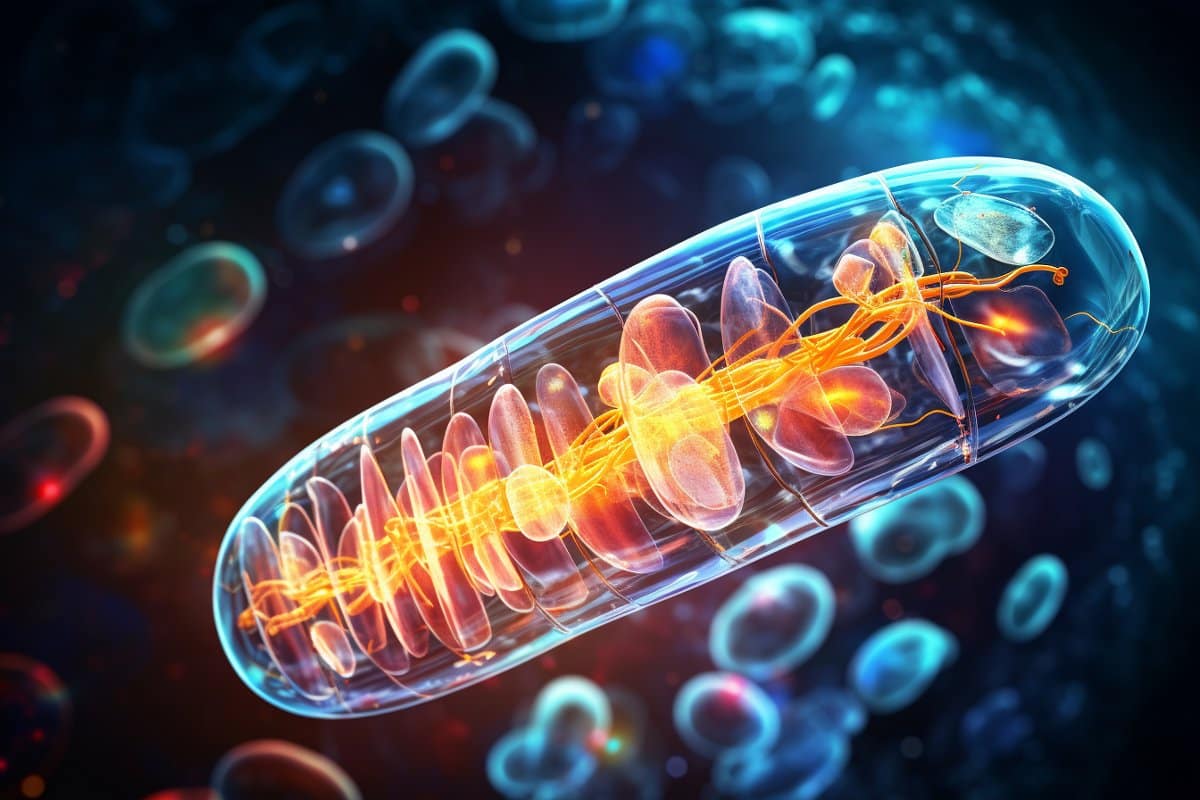Researchers have uncovered a crucial molecular complex for moving mitochondria inside neurons. This finding provides new insights into preventing neurodegenerative diseases. The complex, known as Alex3/Gαq, plays a central role in distributing energy-producing mitochondria throughout neurons. This distribution is essential for neurotransmission and neuronal functions. This discovery could potentially lead to new therapeutic approaches against Parkinson’s disease, neuromuscular disorders, and certain cancers by targeting the mitochondrial transport mechanism. The study highlights the complex’s significance in maintaining neuronal health and viability and suggests that manipulating this system could offer innovative treatments for a range of diseases linked to mitochondrial dysfunction.Key Facts:The Alex3/Gαq complex controls the precise distribution and transport of mitochondria in neurons, which is critical for energy supply and neuronal function.Disruption in this system leads to motor deficits, reduced dendritic and axonal arborizations, and neuronal death, highlighting its importance in neurodevelopment and health.The study suggests the possibility of controlling mitochondrial biology through external G protein-coupled receptors, providing a novel strategy for treating mitochondrial and neuromuscular diseases, as well as certain cancers.Source: University of BarcelonaThe brain, which consumes nearly 20 to 25% of the body’s energy, relies on the transport and precise distribution of mitochondria, the energy-generating cell organelles, in each neuron. A study published in the journal Science Signaling has for the first time identified a molecular complex that regulates the transport of mitochondria within neurons and neuronal death. This newly discovered complex, unique to the most evolved mammals, could lead to the identification of new therapeutic targets for neurodegenerative diseases, such as Parkinson’s disease, neuromuscular diseases, and certain types of tumors.  The study reveals the Alex3/Gαq mitochondrial complex interacts with the mitochondria machinery to distribute and transport these cell organelles along the neurons’ axons and dendrite. Credit: Neuroscience NewsThe study, led by Professor Eduardo Soriano from the University of Barcelona and the Institute of Neurosciences of the UB (UBneuro), along with researcher Anna María Aragay from the Spanish National Research Council (CSIC) and the Institute of Molecular Biology of Barcelona (IBMB-CSIC), was conducted on animal models and cell cultures. The article, authored by Ismael Izquierdo-Villalba (IBMB-CSIC), Serena Mirra, and Yasmina Manso (UB-CIBERNED), with contributions from Adolfo López de Munain from the University Hospital of Donostia, and Xavier Navarro from the Autonomous University of Barcelona (UAB), both members of CIBERNED, as well as José Antonio Enríquez, a collaborator at the Biomedical Networking Research on Fragility and Healthy Ageing (CIBERFES) and the National Centre of Cardiovascular Research Carlos III (CNIC).Providing energy for neuronal functions“In neurons, the transport process of mitochondria is crucial, as these organelles must be present along all axons and dendrites to supply energy for neurotransmission and neuronal functions, which require a significant amount of energy. This high energy demand depends on a specific and precise distribution of mitochondria within neurons,” points out Soriano, co-director of the study and member of the Department of Cell Biology, Physiology, and Immunology at the UB’s Faculty of Biology. The study reveals that the Alex3/Gαq mitochondrial complex interacts with the mitochondria machinery to distribute and transport these cell organelles along the neurons’ axons and dendrite. This process relies on the interaction of the Gq protein with the Alex3 mitochondrial protein. “For the first time, we found that the Alex3/Gαq is essential not only for the transport and mitochondrial function, but also for neuronal physiology, movement control and neuronal viability. If this system is inactivated — for example, in mice with a specific deficiency of the Alex3 protein in the central nervous system — the mitochondrial trafficking is reduced, there is less dendritic and axonal arborizations and this causes motor deficits and even neuronal death,” says Aragay, co-director of the study. The authors had previously described in other articles that the Alex3 and Gαq proteins regulated mitochondrial transport. However, they did not know how these interacted or what molecular mechanisms were involved in the process.The interaction of the Alex3/Gαq mitochondrial complex is regulated through the G protein-coupled receptors (GPCR), according to the study. These receptors have many molecules — neurotransmitters, hormones, cannabinoids, etc. — with different functions in the organism.“The activation of GPCRs not only alters the mitochondrial distribution but also its function, and as a notable effect, the neuronal growth and viability. Our study suggests that, in general, these molecules that interact with these receptors could regulate several aspects of the mitochondrial biology through the GPCR”, noted the experts.Controlling receptors to fight human diseasesWhile the action mechanisms are not well known yet, different functions played by the Alex3 protein could be associated with many pathologies. For instance, it appears that deletions of the Alex3 facilitate the development of certain tumors (epithelial cancers). In other cases, the deletion or inhibition of its expression has a protective effect on certain tumors (liver cancers). In addition to its association with cancer, certain genic variants of the Alex3 protein and its genic family are also related to neurodegenerative diseases, especially Parkinson’s, sleep apnea, and metabolic diseases.“The fact that inactivating mutations have not been identified in the databanks of thousands of human genomes would indicate that the Alex3 gene has a relevant function. Its total loss is not viable in the organism, and it would be found as a somatic mutation in tumors,” says Professor Gemma Marfany, co-author of the study and member of the UB’s Department of Genetics, Microbiology, and Statistics, the Institute of Biomedicine of the UB (IBUB), and the Rare Diseases Networking Biomedical Research Centre (CIBERER).“Moreover, mutations in the gene that codes for Gαq in humans lead to motor disorders, cognitive deficits, intellectual disability, and epilepsy,” notes Aragay. The authors emphasize that these data demonstrate the significance of the identified complex for neuronal function.“Being able to control mitochondrial biology from outside the cell via GPCR receptors is a great advantage. Currently, many specific molecules activate or inhibit these receptors, so it is important to explore the possibility of controlling the localization and biology of mitochondria in diseases where there is a deficit of these organelles (e.g. mitochondrial or neuromuscular diseases), or in pathologies where inhibition of metabolism has positive therapeutic effects (e.g. cancer),” the team concludes.About this genetics and neuroscience research newsAuthor: Rosa Martínez
The study reveals the Alex3/Gαq mitochondrial complex interacts with the mitochondria machinery to distribute and transport these cell organelles along the neurons’ axons and dendrite. Credit: Neuroscience NewsThe study, led by Professor Eduardo Soriano from the University of Barcelona and the Institute of Neurosciences of the UB (UBneuro), along with researcher Anna María Aragay from the Spanish National Research Council (CSIC) and the Institute of Molecular Biology of Barcelona (IBMB-CSIC), was conducted on animal models and cell cultures. The article, authored by Ismael Izquierdo-Villalba (IBMB-CSIC), Serena Mirra, and Yasmina Manso (UB-CIBERNED), with contributions from Adolfo López de Munain from the University Hospital of Donostia, and Xavier Navarro from the Autonomous University of Barcelona (UAB), both members of CIBERNED, as well as José Antonio Enríquez, a collaborator at the Biomedical Networking Research on Fragility and Healthy Ageing (CIBERFES) and the National Centre of Cardiovascular Research Carlos III (CNIC).Providing energy for neuronal functions“In neurons, the transport process of mitochondria is crucial, as these organelles must be present along all axons and dendrites to supply energy for neurotransmission and neuronal functions, which require a significant amount of energy. This high energy demand depends on a specific and precise distribution of mitochondria within neurons,” points out Soriano, co-director of the study and member of the Department of Cell Biology, Physiology, and Immunology at the UB’s Faculty of Biology. The study reveals that the Alex3/Gαq mitochondrial complex interacts with the mitochondria machinery to distribute and transport these cell organelles along the neurons’ axons and dendrite. This process relies on the interaction of the Gq protein with the Alex3 mitochondrial protein. “For the first time, we found that the Alex3/Gαq is essential not only for the transport and mitochondrial function, but also for neuronal physiology, movement control and neuronal viability. If this system is inactivated — for example, in mice with a specific deficiency of the Alex3 protein in the central nervous system — the mitochondrial trafficking is reduced, there is less dendritic and axonal arborizations and this causes motor deficits and even neuronal death,” says Aragay, co-director of the study. The authors had previously described in other articles that the Alex3 and Gαq proteins regulated mitochondrial transport. However, they did not know how these interacted or what molecular mechanisms were involved in the process.The interaction of the Alex3/Gαq mitochondrial complex is regulated through the G protein-coupled receptors (GPCR), according to the study. These receptors have many molecules — neurotransmitters, hormones, cannabinoids, etc. — with different functions in the organism.“The activation of GPCRs not only alters the mitochondrial distribution but also its function, and as a notable effect, the neuronal growth and viability. Our study suggests that, in general, these molecules that interact with these receptors could regulate several aspects of the mitochondrial biology through the GPCR”, noted the experts.Controlling receptors to fight human diseasesWhile the action mechanisms are not well known yet, different functions played by the Alex3 protein could be associated with many pathologies. For instance, it appears that deletions of the Alex3 facilitate the development of certain tumors (epithelial cancers). In other cases, the deletion or inhibition of its expression has a protective effect on certain tumors (liver cancers). In addition to its association with cancer, certain genic variants of the Alex3 protein and its genic family are also related to neurodegenerative diseases, especially Parkinson’s, sleep apnea, and metabolic diseases.“The fact that inactivating mutations have not been identified in the databanks of thousands of human genomes would indicate that the Alex3 gene has a relevant function. Its total loss is not viable in the organism, and it would be found as a somatic mutation in tumors,” says Professor Gemma Marfany, co-author of the study and member of the UB’s Department of Genetics, Microbiology, and Statistics, the Institute of Biomedicine of the UB (IBUB), and the Rare Diseases Networking Biomedical Research Centre (CIBERER).“Moreover, mutations in the gene that codes for Gαq in humans lead to motor disorders, cognitive deficits, intellectual disability, and epilepsy,” notes Aragay. The authors emphasize that these data demonstrate the significance of the identified complex for neuronal function.“Being able to control mitochondrial biology from outside the cell via GPCR receptors is a great advantage. Currently, many specific molecules activate or inhibit these receptors, so it is important to explore the possibility of controlling the localization and biology of mitochondria in diseases where there is a deficit of these organelles (e.g. mitochondrial or neuromuscular diseases), or in pathologies where inhibition of metabolism has positive therapeutic effects (e.g. cancer),” the team concludes.About this genetics and neuroscience research newsAuthor: Rosa Martínez
Source: University of Barcelona
Contact: Rosa Martínez – University of Barcelona
Image: The image is credited to Neuroscience NewsOriginal Research: Closed access.
“A mammalian-specific Alex3/Gαq protein complex regulates mitochondrial trafficking, dendritic complexity, and neuronal survival” by Eduardo Soriano et al. Science SignalingAbstractA mammalian-specific Alex3/Gαq protein complex regulates mitochondrial trafficking, dendritic complexity, and neuronal survivalMitochondrial dynamics and trafficking are essential to provide the energy required for neurotransmission and neural activity. We investigated how G protein–coupled receptors (GPCRs) and G proteins control mitochondrial dynamics and trafficking.The activation of Gαq inhibited mitochondrial trafficking in neurons through a mechanism that was independent of the canonical downstream PLCβ pathway. Mitoproteome analysis revealed that Gαq interacted with the Eutherian-specific mitochondrial protein armadillo repeat–containing X-linked protein 3 (Alex3) and the Miro1/Trak2 complex, which acts as an adaptor for motor proteins involved in mitochondrial trafficking along dendrites and axons.By generating a CNS-specific Alex3 knockout mouse line, we demonstrated that Alex3 was required for the effects of Gαq on mitochondrial trafficking and dendritic growth in neurons. Alex3-deficient mice had altered amounts of ER stress response proteins, increased neuronal death, motor neuron loss, and severe motor deficits.These data revealed a mammalian-specific Alex3/Gαq mitochondrial complex, which enables control of mitochondrial trafficking and neuronal death by GPCRs.
Mitochondrial Transport Key to Neurological Health – Neuroscience News











:max_bytes(150000):strip_icc()/PLTRChart-71ec74b79d4442c2a8719bc71da59b23.gif)



